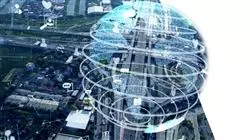University certificate
The world's largest faculty of information technology”
Introduction to the Program
You will have the guarantee of specializing at an international level in a booming sector that will catapult you to professional success"

A city is an urban space with a high population density in which diverse activities are developed for social life with a high level of interaction. Consequently, a Smart City provides a traditional city with tools and systems that make its habitability more efficient. This qualification teaches the foundations of the technological architecture of Smart Cities, such as the parameterization and sensorization of their environments, the datification of public infrastructures, the measurement and scanning of social events and the advanced analysis of urban dynamics, among others.
At the same time, there is Natural Language Processing (NLP), understood as the study of how machines understand human language. Nowadays, NLP is used for various functions such as mail filters, wizards, search results, automatic translations, sentiment analysis, automatic subtitles, etc. This Postgraduate diploma provides specialized knowledge about the main current uses of NLP and the libraries that allow working with NLP focused on industrial projects.
Training a model from scratch requires a large amount of previously catalogued information, approximately 10,000 photos of each of the types to be differentiated. This takes hours to achieve good results. But in many cases, it is possible to start from previously trained models, this technique is known as Transfer Learning. This program examines which network models are currently available, in order to facilitate the training of any model by applying the Transfer Learning technique.
Over the course of 6 months, The Student Body will deepen their understanding of the scope of application of each technology, understanding the competitive advantages they bring, so that they will be positioned at the technological forefront and will be able to lead ambitious projects, now and in the future. Furthermore, graduates have the best 100% online study methodology, which eliminates the need to attend classes in person or be constrained by a predetermined schedule.
You will only need a device with Internet access to develop the ability to innovate in the market as an active part of the real digital transformation"
This Postgraduate diploma in Smart Cities and Artificial Intelligence (AI) contains the most complete and up-to-date educational program on the market. Its most notable features are:
- Case studies presented by experts in Smart Cities and Artificial Intelligence
- The graphic, schematic, and practical contents with which they are created, provide practical information on the disciplines that are essential for professional practice
- Practical exercises where self-assessment can be used to improve learning
- Its special emphasis on innovative methodologies
- Theoretical lessons, questions to the expert, debate forums on controversial topics, and individual reflection assignments
- Content that is accessible from any fixed or portable device with an Internet connection
You will examine which network models are currently available, in order to enhance the training of our model by applying the Transfer Learning technique"
The program’s teaching staff includes professionals from the sector who contribute their work experience to this educational program, as well as renowned specialists from leading societies and prestigious universities.
Its multimedia content, developed with the latest educational technology, will allow professionals to learn in a contextual and situated learning environment, i.e., a simulated environment that will provide immersive education programmed to prepare in real situations.
The design of this program focuses on Problem-Based Learning, by means of which professionals must try to solve the different professional practice situations that are presented to them throughout the course. For this purpose, the student will be assisted by an innovative interactive video system created by renowned and experienced experts.
With the implementation of a Smart City, it collects and returns data in real time, turning into an entity with a life of its own"

Study through Word Embedings the different techniques in which words or phrases are related to each other"
Why study at TECH?
TECH is the world’s largest online university. With an impressive catalog of more than 14,000 university programs available in 11 languages, it is positioned as a leader in employability, with a 99% job placement rate. In addition, it relies on an enormous faculty of more than 6,000 professors of the highest international renown.

Study at the world's largest online university and guarantee your professional success. The future starts at TECH”
The world’s best online university according to FORBES
The prestigious Forbes magazine, specialized in business and finance, has highlighted TECH as “the world's best online university” This is what they have recently stated in an article in their digital edition in which they echo the success story of this institution, “thanks to the academic offer it provides, the selection of its teaching staff, and an innovative learning method aimed at educating the professionals of the future”
A revolutionary study method, a cutting-edge faculty and a practical focus: the key to TECH's success.
The most complete study plans on the university scene
TECH offers the most complete study plans on the university scene, with syllabuses that cover fundamental concepts and, at the same time, the main scientific advances in their specific scientific areas. In addition, these programs are continuously being updated to guarantee students the academic vanguard and the most in-demand professional skills. In this way, the university's qualifications provide its graduates with a significant advantage to propel their careers to success.
TECH offers the most comprehensive and intensive study plans on the current university scene.
A world-class teaching staff
TECH's teaching staff is made up of more than 6,000 professors with the highest international recognition. Professors, researchers and top executives of multinational companies, including Isaiah Covington, performance coach of the Boston Celtics; Magda Romanska, principal investigator at Harvard MetaLAB; Ignacio Wistumba, chairman of the department of translational molecular pathology at MD Anderson Cancer Center; and D.W. Pine, creative director of TIME magazine, among others.
Internationally renowned experts, specialized in different branches of Health, Technology, Communication and Business, form part of the TECH faculty.
A unique learning method
TECH is the first university to use Relearning in all its programs. It is the best online learning methodology, accredited with international teaching quality certifications, provided by prestigious educational agencies. In addition, this disruptive educational model is complemented with the “Case Method”, thereby setting up a unique online teaching strategy. Innovative teaching resources are also implemented, including detailed videos, infographics and interactive summaries.
TECH combines Relearning and the Case Method in all its university programs to guarantee excellent theoretical and practical learning, studying whenever and wherever you want.
The world's largest online university
TECH is the world’s largest online university. We are the largest educational institution, with the best and widest online educational catalog, one hundred percent online and covering the vast majority of areas of knowledge. We offer a large selection of our own degrees and accredited online undergraduate and postgraduate degrees. In total, more than 14,000 university degrees, in eleven different languages, make us the largest educational largest in the world.
TECH has the world's most extensive catalog of academic and official programs, available in more than 11 languages.
Google Premier Partner
The American technology giant has awarded TECH the Google Google Premier Partner badge. This award, which is only available to 3% of the world's companies, highlights the efficient, flexible and tailored experience that this university provides to students. The recognition as a Google Premier Partner not only accredits the maximum rigor, performance and investment in TECH's digital infrastructures, but also places this university as one of the world's leading technology companies.
Google has positioned TECH in the top 3% of the world's most important technology companies by awarding it its Google Premier Partner badge.
The official online university of the NBA
TECH is the official online university of the NBA. Thanks to our agreement with the biggest league in basketball, we offer our students exclusive university programs, as well as a wide variety of educational resources focused on the business of the league and other areas of the sports industry. Each program is made up of a uniquely designed syllabus and features exceptional guest hosts: professionals with a distinguished sports background who will offer their expertise on the most relevant topics.
TECH has been selected by the NBA, the world's top basketball league, as its official online university.
The top-rated university by its students
Students have positioned TECH as the world's top-rated university on the main review websites, with a highest rating of 4.9 out of 5, obtained from more than 1,000 reviews. These results consolidate TECH as the benchmark university institution at an international level, reflecting the excellence and positive impact of its educational model.” reflecting the excellence and positive impact of its educational model.”
TECH is the world’s top-rated university by its students.
Leaders in employability
TECH has managed to become the leading university in employability. 99% of its students obtain jobs in the academic field they have studied, within one year of completing any of the university's programs. A similar number achieve immediate career enhancement. All this thanks to a study methodology that bases its effectiveness on the acquisition of practical skills, which are absolutely necessary for professional development.
99% of TECH graduates find a job within a year of completing their studies.
Postgraduate Diploma in Smart Cities and Artificial Intelligence (AI)
Discover the future of smart cities and unleash the power of artificial intelligence with the Postgraduate Diploma in Smart Cities and Artificial Intelligence (AI) program from TECH Global University. Take advantage of the online mode to access this innovative program from anywhere in the world and transform your career without geographical limits. In today's world, cities face increasingly complex challenges. The need to optimize resources, improve the quality of life of citizens and ensure sustainability has become a priority. This is where Smart Cities and Artificial Intelligence (AI) come into play. With our Postgraduate Diploma program, you will dive into the theoretical and practical foundations of Smart Cities, exploring how technology and AI can transform urban management, mobility, energy, security and citizen participation. You will learn how to use cutting-edge tools and techniques to analyze massive data, implement smart solutions, and make strategic decisions based on information.
Enroll now and start advancing in your professional path
The online mode of this program gives you flexibility and convenience, allowing you to study at your own pace and adapt your learning schedule to your personal and professional life. You will be able to access course materials, participate in interactive sessions, interact with subject matter experts and collaborate with other students from around the world, taking full advantage of digital technology. By completing the Postgraduate Diploma in Smart Cities and Artificial Intelligence (AI) program, you will be prepared to face the current and future challenges of smart cities, developing innovative solutions and promoting progress in your environment. Expand your knowledge, acquire new skills and become a highly valued professional in the field of Smart Cities and Artificial Intelligence. Join TECH Global University and start your journey towards a smarter and more sustainable future. enroll now and be part of the Smart Cities and Artificial Intelligence revolution!







